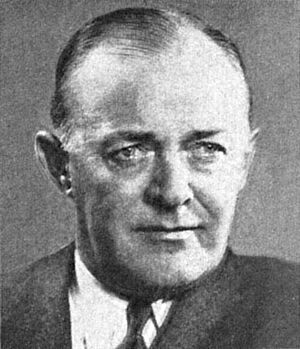Harold D. Cooley facts for kids
Quick facts for kids
Harold D. Cooley
|
|
|---|---|
 |
|
| Chairman of the House Agriculture Committee | |
| In office January 3, 1949 – January 3, 1953 |
|
| Preceded by | Clifford R. Hope |
| Succeeded by | Clifford R. Hope |
| Member of the U.S. House of Representatives from North Carolina's 4th district |
|
| In office July 7, 1934 – December 30, 1966 |
|
| Preceded by | Edward W. Pou |
| Succeeded by | Jim Gardner |
| Personal details | |
| Born | July 26, 1897 Nashville, North Carolina, U.S. |
| Died | January 15, 1974 (aged 76) Wilson, North Carolina, U.S. |
| Political party | Democratic |
| Alma mater | University of North Carolina, Yale University Law School |
| Occupation | lawyer |
Harold Dunbar Cooley (born July 26, 1897 – died January 15, 1974) was an American politician. He was a member of the Democratic Party. Cooley represented the Fourth Congressional District of North Carolina. He served in the U.S. Congress from 1934 to 1966.
Early Life and Education
Harold Cooley was born on July 26, 1897. His hometown was Nashville, North Carolina. He went to college at the University of North Carolina at Chapel Hill. Later, he studied law at Yale University Law School.
Political Career
Before becoming a politician, Cooley worked as a lawyer. He also served in the military during World War I. He was part of the United States Naval Aviation Flying Corps.
In 1934, Cooley was elected to the U.S. Congress. He won a special election to fill a vacant seat. He was re-elected 16 times after that. He served in Congress until he resigned on December 30, 1966.
Harold Cooley holds a record in Congress. He was the longest-serving Chairman of the House Committee on Agriculture. This committee deals with laws about farming and food.
During his time in Congress, important changes were happening in the United States. Laws were being passed to end segregation. Segregation was when people were kept separate based on their race. Cooley voted against some of these laws. These included the Civil Rights Act of 1964 and the Voting Rights Act of 1965. Many Southern politicians at the time held similar views.
In 1964, Cooley almost lost his election. Then, in 1966, he lost to James Carson Gardner. This was a big surprise at the time.
Later Life and Legacy
Harold Cooley passed away on January 15, 1974. He died in Wilson, North Carolina. He is buried in Forest Hill Cemetery in Nashville, North Carolina.
His childhood home in Nashville is important. It is called the Bissette-Cooley House. This house was added to the National Register of Historic Places in 1985. This means it is recognized as a special historical place.
 | Precious Adams |
 | Lauren Anderson |
 | Janet Collins |

